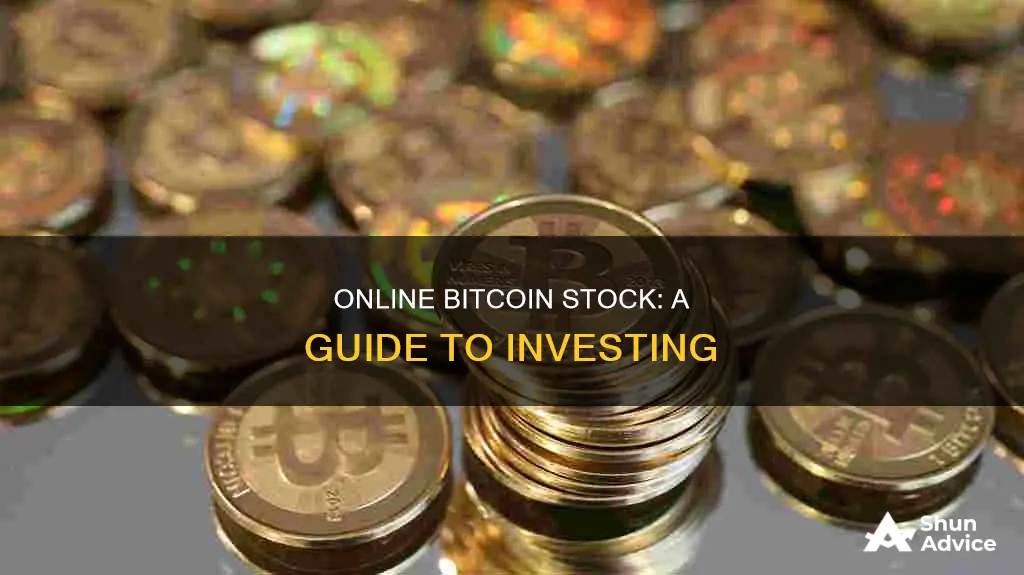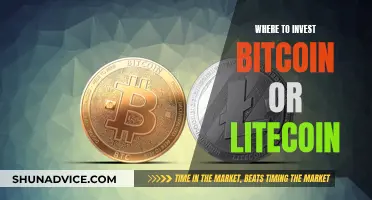
Investing in Bitcoin can be a daunting task for beginners, but it's not as complicated as it seems. Here's a step-by-step guide to help you get started with investing in Bitcoin over the internet:
Step 1: Understanding Bitcoin
Before investing, it's crucial to understand what Bitcoin is and how it works. Bitcoin is a type of cryptocurrency or virtual currency that utilizes blockchain technology to facilitate secure and transparent transactions. It was created to address some of the flaws in the traditional financial system and to provide an alternative to fiat currencies.
Step 2: Choosing an Exchange
To invest in Bitcoin, you'll need to use a cryptocurrency exchange. Popular exchanges include Coinbase, Binance, Kraken, Gemini, and more. These platforms allow you to buy, sell, and trade Bitcoin and other cryptocurrencies. When choosing an exchange, consider factors such as security, fees, payment options, and geographic availability.
Step 3: Creating an Account
Sign up for an account on your chosen exchange by providing personal information and verifying your identity. This process may vary depending on the exchange and your location. Some exchanges may also require you to set up two-factor authentication for added security.
Step 4: Funding Your Account
Once your account is set up, you'll need to fund it by connecting it to your bank account or using a credit/debit card. Different exchanges offer different payment options, so choose one that suits your needs. Keep in mind that using a credit card may incur higher transaction fees and interest charges.
Step 5: Placing Your First Order
After funding your account, you're ready to place your first Bitcoin order. Decide how much Bitcoin you want to purchase, keeping in mind that you can buy fractions of a Bitcoin. The amount you invest will depend on your risk tolerance and investment strategy.
Step 6: Storing Your Bitcoin
When you buy Bitcoin, you'll need a secure place to store it. You can use a hot wallet, which is an online wallet provided by the exchange or a third-party provider. Alternatively, you can use a cold wallet, which is an offline hardware device that offers more security but may be more complicated to set up.
Step 7: Managing Your Investments
Once you've purchased Bitcoin, you can choose to hold onto it for the long term, use it for online transactions, or trade it for other cryptocurrencies. Remember that Bitcoin is a highly volatile asset, so be prepared for price fluctuations and consider diversifying your investments to manage risk.
| Characteristics | Values |
|---|---|
| What you need to invest in Bitcoin | Personal identification documents, bank account information, and a secure internet connection |
| How to invest in Bitcoin | Join a Bitcoin exchange, get a Bitcoin wallet, connect your wallet to a bank account, place your Bitcoin order, and manage your Bitcoin investments |
| Where to buy Bitcoin | Cryptocurrency exchanges such as Gemini, Kraken, Coinbase, Crypto.com, Binance, and eToro |
| How much to invest in Bitcoin | It is recommended that cryptocurrencies make up no more than 5% of your portfolio. Your initial investment could be as low as $25 |
| Risks of investing in Bitcoin | Bitcoin is a very high-risk and volatile investment. Its value may decrease dramatically in a short period, and it is prone to "pump-and-dump" schemes |
What You'll Learn

Choosing a crypto-trading service or venue
There are several factors to consider when choosing a crypto-trading service or venue. Here are some key points to keep in mind:
- Security and Regulation: The security of your funds should be a top priority. Look for platforms that implement robust security measures such as two-factor authentication (2FA), cold storage wallets, and encryption protocols. Also, ensure that the platform is compliant with relevant regulatory standards to protect yourself from potential scams or legal issues.
- Reputation and Track Record: Research the reputation and history of the platform, including user reviews and community feedback. Opt for platforms with a solid reputation and a proven track record of reliable service.
- Supported Crypto-assets: Different platforms support different cryptocurrencies. Ensure that the platform you choose offers the crypto-assets you want to trade or invest in, such as Bitcoin (BTC), Ethereum (ETH), and other major altcoins.
- Liquidity: Choose a platform with good liquidity to ensure smooth transactions and minimize the risk of slippage. Higher liquidity allows for easier buying or selling of crypto-assets without significantly impacting their price.
- User Interface and Experience: Look for a platform with an intuitive and user-friendly interface, especially if you are a beginner. Additionally, check if the platform offers a mobile app for trading on the go.
- Fees: Compare the fee structures of different platforms, as exchanges charge fees for deposits, withdrawals, and trading activities. Be cautious of hidden fees or excessively high charges, as they can eat into your profits.
- Customer Support: Prompt and reliable customer support is crucial, especially when you encounter issues or have queries. Check if the platform provides multiple channels for support, such as live chat, email, or phone.
- Geographical Restrictions: Some platforms have geographical restrictions, so ensure that the platform you choose operates in your country or region. Also, consider if they offer localized language support and comply with local regulations.
- Trading Tools and Features: If you are an advanced trader, look for platforms that offer a variety of trading tools and features, such as charting tools, order types, stop-loss options, and margin trading.
- Transparency and Reporting: Look for platforms that provide regular reports on trading volume and audits. Transparent platforms inspire trust and allow you to make informed investment decisions.
Some popular crypto-trading services or venues include Coinbase, Kraken, Gemini, Binance, Crypto.com, and Robinhood. Compare their features and fees before making your decision.
Mr Beast's Bitcoin Adventure: Did He Invest?
You may want to see also

Connecting your exchange to a payment option
It is important to note that while you can use a credit card to purchase cryptocurrency, it is not advisable due to the associated processing fees and the risk of fraud. Credit card companies treat cryptocurrency purchases as cash advances, which often come with high-interest rates. Additionally, the volatility of the cryptocurrency market could increase the overall cost of your purchase when combined with a credit card's interest charges.
Some banks may question or even stop deposits to crypto-related sites or exchanges, so it is essential to check with your bank before proceeding.
Fees vary for deposits via a bank account, debit, or credit card, and exchanges also charge fees per transaction. Therefore, it is crucial to research the fees associated with your chosen exchange and payment method before proceeding.
Another option for connecting your exchange to a payment option is to use a payment processor like PayPal. PayPal allows you to connect your account to a debit card, bank account, or use the balance in your PayPal account to purchase cryptocurrencies from a third-party provider. However, it is important to note that PayPal does not allow you to transfer cryptocurrencies purchased on its platform to other accounts or wallets.
If you want more flexibility in transferring your cryptocurrencies, you can use crypto exchanges like Coinbase and eToro, which allow you to link your PayPal account as a payment processor to purchase crypto. In this case, PayPal serves as a deposit method to fund your account.
Other payment options include using a crypto debit card or a peer-to-peer (P2P) payment directly from your wallet to another wallet.
Kevin Durant's Coinbase Investment: A Smart Move?
You may want to see also

Placing an order
Now you're ready to purchase Bitcoin. Your cryptocurrency exchange will have everything you need to buy. The big question is, how much Bitcoin should you purchase?
Some coins cost thousands of dollars, but exchanges often allow you to buy fractions of a single coin—your initial investment could be as low as $25.
Investing in Bitcoin is very risky, and it’s important that you carefully determine your risk tolerance and review your investment strategy before you purchase any Bitcoin.
If you’re going to be purchasing coins through a stockbroker, you may not need to supply your personal information or financial information because your stockbroker will likely have all that on record.
To get started, you will need to sign up for a reliable exchange, verify your identity, and fund your account. From there, you can set your own market limit orders to buy bitcoin.
If you decide to purchase from an exchange, you’ll have to decide which exchange you want to buy from. Here are a few of the most popular options:
- Coinbase: A very popular crypto exchange that insures losses in the event of a security breach or fraudulent transfers
- Binance: Founded in 2017, Binance is a crypto exchange with a strong focus on altcoins
- Kraken: This San Francisco-based exchange allows you to invest in Bitcoin using various currencies from around the world
- Gemini: Launched in 2015 by Cameron and Tyler Winklevoss, Gemini offers services for casual and veteran Bitcoin investors with different user interfaces and fee structures
- Bitfinex: The longest-running cryptocurrency exchange that’s optimized for advanced traders and lenders (unfortunately, Bitfinex doesn’t currently accept US customers)
A Step-by-Step Guide to Buying Bitcoin on Coinbase
- Create an account on Coinbase and verify your identity.
- Fund your account with fiat currency.
- Make an order to buy your cryptocurrency. Orders on an exchange work the same way as orders in the stock market. The exchange will match your buy order with someone making a sell order at the same price and make the trade.
- Once your trade is complete, the exchange will hold your cryptocurrency for you in a custodial wallet.
The Crypto Coin Investment Guide: Best Picks
You may want to see also

Safe storage
Cold wallets are considered the most secure way to store your bitcoin. They are not connected to the internet and are therefore less likely to be compromised. Examples of cold wallets include hardware wallets, paper wallets, and cold storage solutions using general-purpose computing hardware.
Hardware wallets are small, encrypted portable devices that allow you to download and carry your Bitcoin. They are considered much more secure than hot wallets. Examples of hardware wallets include Trezor and Ledger, which support BTC.
Paper wallets are typically generated by potentially compromised PCs connected to the internet and then printed for offline storage. However, this is not enough as malware running on the computer may steal your private keys and then later steal any Bitcoin you send to that address. Many internet-connected printers also save printed documents to memory, so it is important to ensure your printer is not connected to the internet.
Another option for cold storage is to use a general-purpose computing device. This involves setting up an online computer with an internet connection and an offline computer without an internet connection. The offline computer must have bitcoin wallet software installed, which will generate a wallet and a seed phrase written on paper or another medium. The master public key of the wallet is then transferred to the online computer to create a watch-only wallet. This allows you to receive money and monitor transactions without exposing your private keys to the internet.
When choosing a storage method, it is important to consider the risks and take the necessary precautions to secure your Bitcoin.
Coinbase: A Guide to Investing in the Company
You may want to see also

Understanding the risks and potential rewards
Bitcoin is a risky investment, so it's important to carefully consider your goals and strategy before deciding to invest. Here are some of the risks and potential rewards of investing in Bitcoin.
Risks
- Volatile and fluctuating market: The price of Bitcoin is constantly changing, and there's no way to predict if you will get a return on your investment.
- Cyberattacks and hacking: Cryptocurrency is technology-based, which makes it vulnerable to cyberattacks and hacking. If your Bitcoin wallet is hacked, there is usually no way to retrieve your lost or stolen Bitcoins.
- Fraud: There is a fair amount of fraud in the Bitcoin market, with fake exchanges and fraudulent activities duping investors out of their Bitcoins.
- Little or no regulation: The Bitcoin market currently operates without any major regulations, and the government doesn't have a clear stance on cryptocurrency. This lack of regulation could lead to problems in the future if Bitcoin poses competition for government currency.
- Technology reliance: Bitcoin is entirely reliant on technology. Without the technology that supports it, Bitcoin would be worthless. This also makes Bitcoin owners more vulnerable to cyber threats and online fraud.
- Block withholding: A mining pool can use computational power to mine a block and hide it from honest miners, allowing a select few to reap the benefits while others lose out.
- Limited acceptance: Only a few companies and retailers currently accept Bitcoin as a legitimate form of currency or exchange.
- No guaranteed value: The lack of guaranteed value and its digital nature mean that buying and using Bitcoin carries several inherent risks.
- Security risk: Popular cryptocurrency exchanges are at risk from hackers, malware, and operational glitches, which could result in the loss of Bitcoins.
- Insurance risk: Bitcoin and other cryptocurrencies are not insured by the Securities Investor Protection Corporation (SIPC) or the Federal Deposit Insurance Corporation (FDIC). While some exchanges provide insurance, it usually only covers failures in their systems or cybersecurity breaches.
- Market risk: As with any investment, Bitcoin values can fluctuate wildly and are highly sensitive to newsworthy events.
Potential Rewards
- Potential for high returns: Bitcoin has seen meteoric growth in recent years, and some analysts believe its price could rise even further as cryptocurrency and blockchain technology become more integrated into people's daily lives.
- Decentralized and peer-to-peer: Bitcoin offers a decentralized and peer-to-peer payment system that allows users to send and receive money without going through financial institutions. This can be especially useful for people who don't have access to traditional banking services.
- Increasing acceptance: While Bitcoin is not yet widely accepted as a currency, more companies and retailers are beginning to accept it, and the number is expected to grow.
- Borderless and fast transactions: Bitcoin transactions are not limited by geographical borders and can often be faster and more efficient than traditional money transfer systems.
- Enhanced security and privacy: Bitcoin transactions are secured by blockchain technology, which makes it difficult to alter transaction data without changing all other blocks in the chain. This enhances the security and privacy of transactions.
- Potential for mainstream adoption: As Bitcoin and blockchain technology become more integrated into people's lives, there is a potential for it to gain mainstream adoption and become a widely accepted form of currency and exchange.
The Best Bitcoin Investment: Company Guide
You may want to see also
Frequently asked questions
A Bitcoin Stock Exchange is a trading platform where people can access real-time prices to freely buy, sell or exchange bitcoin with other virtual currencies or traditional fiat currencies such as the US dollar, Euro or British Pound.
Sign up for a reliable exchange, verify your identity, and fund your account to begin trading bitcoin. From here, you can set your own market limit orders to buy bitcoin.
Coinbase is a very popular platform for beginners and investors alike. It has a great user interface and is known, used and trusted by millions of customers worldwide.
Etoro is the most popular and best overall trading platform for buying bitcoin stock in large volumes with high liquidity.
A cold wallet is the safest storage method for your coins. It is an actual piece of hardware that stores your coins, usually a portable device that’s similar to a flash drive.







